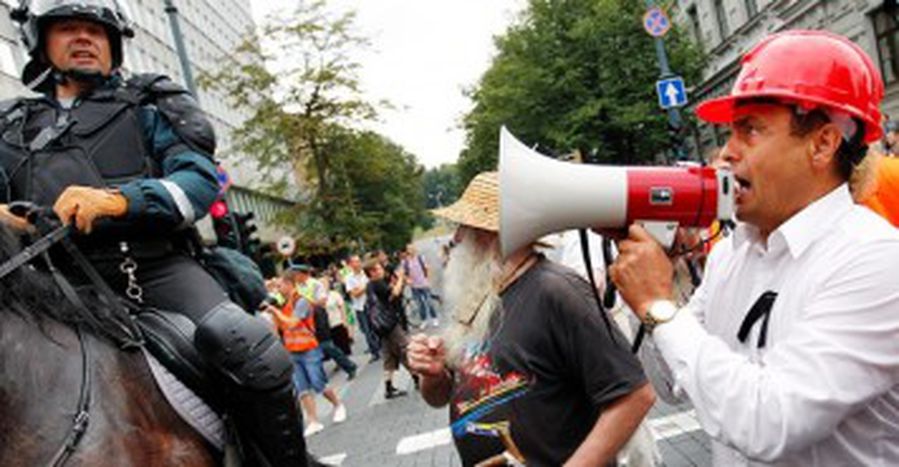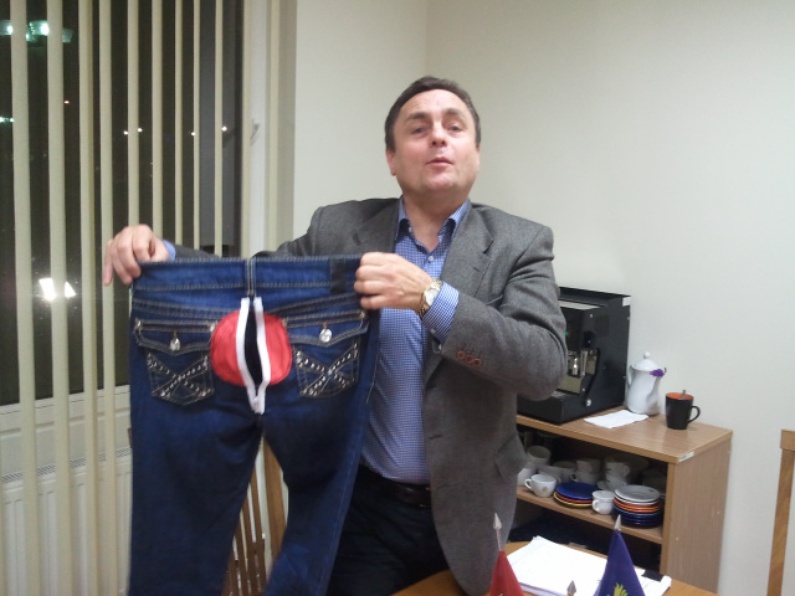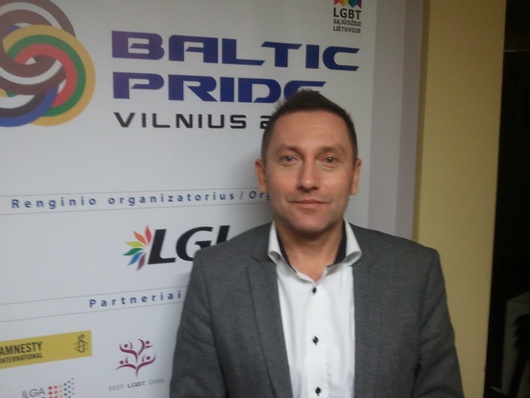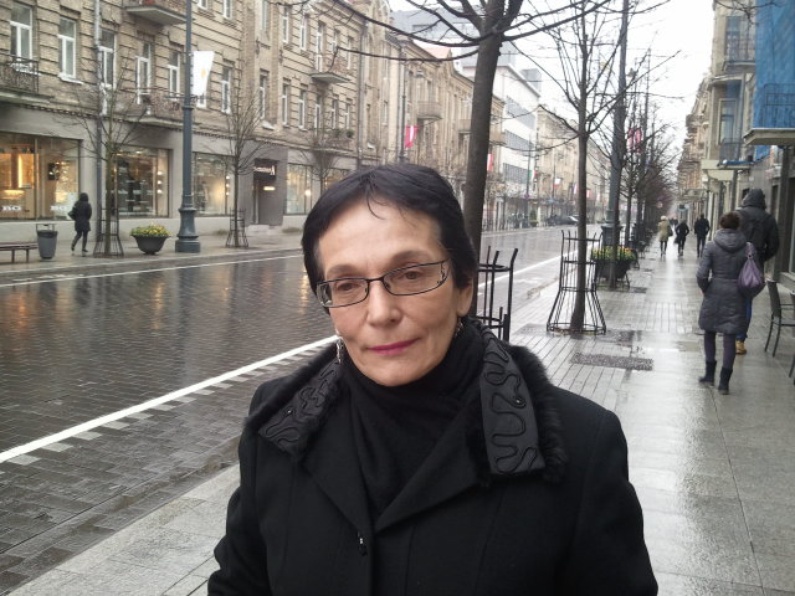
LGBT RIGHTS IN LITHUANIA - ONE STEP FORWARD, TWO STEPS BACK?
Published on
Translation by:
Lewis FairfaxThe fight against homophobia in Lithuania still has a long way to go. Politics, media, and the Church stand between the LGBT community and social acceptance. And the EU doesn't seem to be doing anything to change the status quo. Here's the first of our reports on the situation.
Lithuanian MP Petras Gražulis proudly holds up a pair of jeans with a zip on the backside. We are in his office in the Seimas- Lithuania's parliament- discussing the 55-year-old MP’s hatred of homosexuals. Gražulis is the leader of the populist right-wing party ‘Order and Justice’. He has had the jeans made specially to show his disgust for homosexuals. On 12 November he visited the LGBT association in Vilnius to show them off in person and to offer a pair as a gift. ‘I'm going to get them patented, I'll sell tonnes of them,’ he assures me, before launching into a long diatribe backed up by an abundance of Bible quotes. He proposes ways of ‘curing’ homosexuality, which he calls ‘a curse brought from the EU.’
 Gražulis' initiative would seem like nothing more than a joke in bad taste if it wasn’t so distressingly symptomatic of the state of gay rights in Lithuania, a country of 3.5 million people. ‘Everyone's heard about what he did,’ laments Vladimir Simonko, president of the Lithuanian Gay League (LGL), 'but not a single politician has condemned it.’
Gražulis' initiative would seem like nothing more than a joke in bad taste if it wasn’t so distressingly symptomatic of the state of gay rights in Lithuania, a country of 3.5 million people. ‘Everyone's heard about what he did,’ laments Vladimir Simonko, president of the Lithuanian Gay League (LGL), 'but not a single politician has condemned it.’
35% of LITHUANIANS are against GAY POLITICIANS
There have been several studies showing the extent of Lithuania’s animosity towards homosexuals. Only 52% of Lithuanians support equal opportunities for gay people in the labour market, according to a state ombudsman's report. 42% of those asked said they would be scared if their child was taught by a gay teacher. A study by the Vienna-based European Union Agency for Fundamental Rights showed that 61% of LGBTI (lesbian, gay, bisexual, transgender/transexual, intersex) people in Lithuania had been discriminated against or harassed - the highest rate in the EU.
No fewer than five draft laws are being drawn up which could quite easily be called homophobic or anti-transexual: bans on sex changes and gay adoption, criminalisation of, ‘the defamation of constitutional ethical values,’ (i.e. the idea that marriage is only between a man and a woman), the removal of ‘homophobic insults’ as an offence from the Penal Code, and the halting of public financial support for public protests (i.e. gay pride festivals). What's more, several attempts have been made to enshrine marriage in the Constitution as an institution between a man and a woman, as has been done in Croatia.
A TV ad for Baltic Pride was rejected by public broadcasters a few months ago due to an amendment to child protection law which came into force in 2010 and which forbids ‘propaganda in favour of homosexual, bisexual and polygamous relationships.’
The European Parliament voted to approve a resolution against the amendment, but this had little effect. The only way to get the ad shown is to televise it after 11pm, with an ‘adult content’ warning preceding it. As a result, only one commercial channel has approved it for broadcast during the day. ‘It's like Russia here,’ says Simonenko, referring to the Russian law forbidding ‘homosexual propaganda.’ One human rights activist was recently imprisoned for breaking this law.
"OUR POLITICIANS ARE THE PROBLEM"
 Aside from a few minor incidents nearby, and despite the failed attempts of the city's mayor to distance the event from the city centre, July's Baltic Pride was a success. ‘It feels like every time we take a step forward, we take two steps back,’ sighs Simonko. ‘It's actually our politicians who are the problem. They're convinced that most of our people are homophobes and they act accordingly. Either that, or they dare not come out in favour of homosexuality for fear of losing votes.’ Most people in the country consider homosexuality as either an illness or a perversion to be fought against, according to an enquiry carried out by MPs.
Aside from a few minor incidents nearby, and despite the failed attempts of the city's mayor to distance the event from the city centre, July's Baltic Pride was a success. ‘It feels like every time we take a step forward, we take two steps back,’ sighs Simonko. ‘It's actually our politicians who are the problem. They're convinced that most of our people are homophobes and they act accordingly. Either that, or they dare not come out in favour of homosexuality for fear of losing votes.’ Most people in the country consider homosexuality as either an illness or a perversion to be fought against, according to an enquiry carried out by MPs.
The liberal and social democratic parties have a few members in their ranks who are openly in favour of gay rights, but their number can apparently ‘be counted on one hand.’ Apart from the liberal party currently in opposition, not a single party is campaigning for the introduction of civil partnership for same-sex couples. What's more, Lithuania is governed by a grand coalition, led by Prime Minister Algirdas Butkevičius, comprising Order and Justice, the Social Democratic Party, the Labour Party and the party of the Polish minority, meaning that, ‘when it comes to gay rights, you can forget it,’ says Simonenko.
However, the social democrats possess a powerful human rights activist in 69-year-old professor and feminist Marija Pavilionienė. She says that only four or five of her fellow party members share her point of view. She finds Gražulis' jeans disgusting. ‘Like so many other homophobes, he is obsessed with sexuality. But it's not a question of sex, it's a question of human rights!’ Many social democrats don't buy it, however. ‘I feel a constant pressure to abandon my progressive ideas,’ she admits during a meeting at a café in central Vilnius. ‘I argued with the minister of justice, trying to bring in civil partnerships,’ Pavilionienė explains. ‘He promised me it would happen, but I'm still waiting. The proposal's there waiting, it just has to be taken out of the drawer! But he's scared. Even the president, Grybauskaitė says that the time for civil partnerships hasn't come yet. She wouldn't dare, but if she'd just say that several different kinds of family life are possible, that would greatly help our cause.’ For that matter, rumours abound that Grybauskaitė, who is supported by social conservatives, is herself a lesbian.
 Up until now only one Lithuanian politician has come out as gay - Rokas Žilinskas, 41, a former journalist and news presenter, and serving MP of the conservative ‘Patriotic Union’ party. ‘His party uses him to knock back gay rights,’ says Simonko. ‘He was opposed to Baltic Pride! He believes in silent protest and that homophobia will just sort itself out. He even suggested that I disband my organisation.’
Up until now only one Lithuanian politician has come out as gay - Rokas Žilinskas, 41, a former journalist and news presenter, and serving MP of the conservative ‘Patriotic Union’ party. ‘His party uses him to knock back gay rights,’ says Simonko. ‘He was opposed to Baltic Pride! He believes in silent protest and that homophobia will just sort itself out. He even suggested that I disband my organisation.’
INTERVIEWS CONDUCTED BY JUDITH SINNIGE IN VILNIUS.
Keep an eye out for the second part of the report which will concentrate on the influence of the media and of the church on gay rights in Lithuania.
Translated from Droits des homosexuels en Lituanie : « Un pas en avant, deux en arrière »



